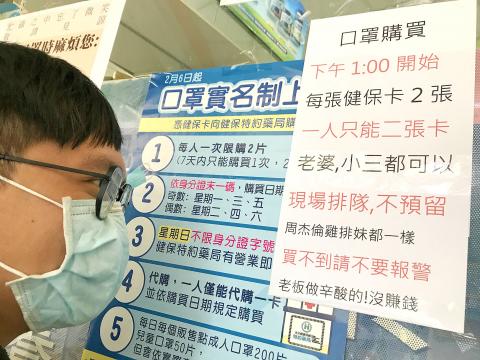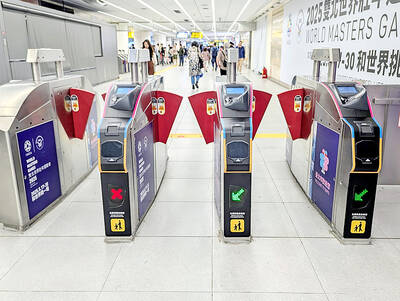Health experts at National Taiwan University (NTU) yesterday urged schools to open windows in classrooms, pull desks wider apart, and lower the definition of a fever to a body temperature higher than 37.4°C when schools start next week, to better prevent COVID-19 infection.
NTU College of Public Health dean Chan Chang-chuan (詹長權) said that disease prevention in schools should be divided into two stages, with the first being the “containment” stage, which includes postponing the start of school and quarantining suspected cases to delay the possibility of COVID-19 spreading locally.
The second stage is the “mitigation” stage, meaning lessening the seriousness of the epidemic by practicing enhanced infection control measures on campuses after school starts or suspending classes if an outbreak occurs.

Photo: CNA
As schools up to and including senior high begin the new semester on Tuesday next week, two weeks later than originally planned, the NTU College of Public Health yesterday gave suggestions on how to improve disease prevention measures on campus.
Institute of Occupational Medicine and Industrial Hygiene associate professor Chen Jia-kun said that good ventilation in classrooms is an important preventive measure, so schools should avoid using classrooms with no windows, as many air-conditioners only circulate indoor air.
“Under good natural ventilation, the air exchange rate [the rate at which outdoor air replaces indoor air within a room] is about 60 seconds,” he said. “Classroom windows should be open for at least one to three minutes for every 20 minutes of class, even in cold weather.”
Increasing the distance between individuals during social interaction helps prevent virus transmission, Chan said, adding that he suggests pulling students’ desks at least 1.8m apart, avoiding sports with physical contact and making students take recess in turns to avoid crowded playgrounds.
Schools should disinfect desk surfaces, doorknobs, windows and keyboards more frequently; keep lids on trash cans; and ask students and faculty to avoid eating with their hands; and wash their hands with soap often, he said.
“Students and faculty should also be responsible ... by not going to school when they feel ill and wearing a mask when seeking medical attention,” Chan said, adding that faculty should be highly cautious and take preventive measures other than measuring their temperature.
Department of Environmental and Occupational Medicine director Su Ta-chen (蘇大成) said that the standard for detecting a fever should be modified to a body temperature of 37.5°C or higher.
If a person has had their temperature taken twice, at least five minutes apart, and it is 37.5°C or more on both occasions, they should be observed for respiratory symptoms, wear a mask when seeking medical attention and stay home to rest, he said.
Centers for Disease Control Deputy Director-General Chuang Jen-hsiang (莊人祥) yesterday said that the Central Epidemic Command Center has suggested that the Ministry of Education use a fever standard of 37.5°C or higher when measuring with a forehead thermometer and 38°C or higher when measuring with an ear thermometer.

A magnitude 6.4 earthquake struck off the coast of Hualien County in eastern Taiwan at 7pm yesterday, the Central Weather Administration (CWA) said. The epicenter of the temblor was at sea, about 69.9km south of Hualien County Hall, at a depth of 30.9km, it said. There were no immediate reports of damage resulting from the quake. The earthquake’s intensity, which gauges the actual effect of a temblor, was highest in Taitung County’s Changbin Township (長濱), where it measured 5 on Taiwan’s seven-tier intensity scale. The quake also measured an intensity of 4 in Hualien, Nantou, Chiayi, Yunlin, Changhua and Miaoli counties, as well as

Credit departments of farmers’ and fishers’ associations blocked a total of more than NT$180 million (US$6.01 million) from being lost to scams last year, National Police Agency (NPA) data showed. The Agricultural Finance Agency (AFA) said last week that staff of farmers’ and fishers’ associations’ credit departments are required to implement fraud prevention measures when they serve clients at the counter. They would ask clients about personal financial management activities whenever they suspect there might be a fraud situation, and would immediately report the incident to local authorities, which would send police officers to the site to help, it said. NPA data showed

ENERGY RESILIENCE: Although Alaska is open for investments, Taiwan is sourcing its gas from the Middle East, and the sea routes carry risks, Ho Cheng-hui said US government officials’ high-profile reception of a Taiwanese representative at the Alaska Sustainable Energy Conference indicated the emergence of an Indo-Pacific energy resilience alliance, an academic said. Presidential Office Secretary-General Pan Men-an (潘孟安) attended the conference in Alaska on Thursday last week at the invitation of the US government. Pan visited oil and gas facilities with senior US officials, including US Secretary of the Interior Doug Burgum, US Secretary of Energy Chris Wright, Alaska Governor Mike Dunleavy and US Senator Daniel Sullivan. Pan attending the conference on behalf of President William Lai (賴清德) shows a significant elevation in diplomatic representation,

The Taipei MRT is to begin accepting mobile payment services in the fall, Taipei Rapid Transit Corp said on Saturday. When the company finishes the installation of new payment units at ticketing gates in October, MRT passengers can use credit cards, Apple Pay, Google Pay and Samsung Pay, the operator said. In addition, the MRT would also provide QR payment codes — which would be compatible with Line Pay, Jkopay, iPass Money, PXPay Plus, EasyWallet, iCash Pay, Taiwan Pay and Taishin Pay — to access the railway system. Currently, passengers can access the Taipei MRT by buying a single-journey token or using EasyCard,